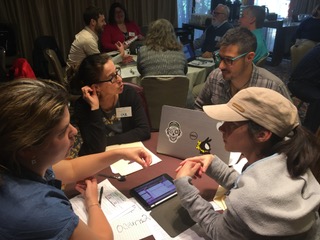The OOI Ocean Data Labs Project
The National Science Foundation’s Ocean Observatories Initiative (OOI) is advancing our ability to understand the natural world by collecting large quantities of data to address complex oceanographic processes. This expanded access to data also provides professors in the geosciences with new opportunities to engage undergraduate students in authentic data experiences using real-world data sets to teach geoscience processes.
However, students struggle to work with data based on their limited experience and exposure to different data types and sources. Also, supporting students in engaging with the data can be challenging for professors too, as there is a lack of adequate tools to easily digest and manipulate large data sets for in-class learning experiences.
Therefore, the OOI Ocean Data Labs Project (formerly called Data Explorations), with funding from NSF, is developing, testing, refining, and disseminating easy to use, interactive Data Explorations and Data Lab Notebooks that will allow undergraduates to use authentic data in accessible ways while being easy for professors to integrate into their teaching.




















